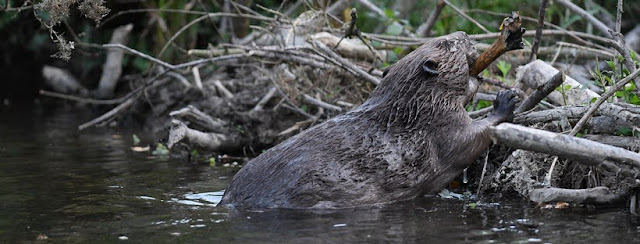Cheshire Wildlife Trust made an exciting announcement this week...
If Hatchmere Nature Reserve can be made ready to receive the beavers by October, there’s every chance it could be home to the first beaver kits (baby beavers) next year!
Beavers in Britain
The Eurasian beaver (Castor fiber) is a large herbivore, a mammal that was formerly native to these shores and once played an important part in our landscape from prehistoric times until it was hunted to extinction in the 16th century for its fur, meat and scent glands. The loss of this charismatic species also led to loss of the mosaic of lakes, meres, mires, tarns and boggy places that it so brilliantly built.
Wildlife Trusts across the country are working hard to bring these fantastic mammals back to Britain.
Why do we need beavers?
This isn't just about the reintroduction of a species - it's about the reintroduction of an entire ecosystem that's been lost.
Beavers are often referred to as 'ecosystem engineers'. They make changes to their habitats, such as digging canal systems, damming water courses and coppicing tree and shrub species, which create diverse wetlands. In turn these wetlands can bring enormous benefits to other species, such as otters, water shrews, water voles, birds, invertebrates (especially dragonflies) and breeding fish.
Beavers and the landscapes they generate benefit both people and wildlife because:
• They help to reduce downstream flooding - the channels, dams and wetland habitats that beavers create hold back water and release it more slowly after heavy rain.
• They increase water retention.
• They clean water.
• They reduce siltation, which pollutes water.
Why Hatchmere?
• Man-made problems are destroying rare habitats at Hatchmere Nature Reserve, and killing aquatic life in the wetlands and in Hatch Mere lake.
• Peat bogs are delicate habitats which need nutrient-poor water. But the brook flowing into the site has become far too rich and nutrient-packed, so the peat bog plants and animals are losing their fight for survival.
• Invasive species like nettles and bramble are thriving on the rich water supply – reducing sunlight and accelerating the loss of peat bog life.
By beavers doing what they do naturally along Hatchmere brook, they will create new habitats and remove nutrient flow into the mere and mosslands. They will also help to remove the invasive species along the brook.
We're not out of the woods yet
Before we can bring beavers back, we must first secure a 10-acre area next to Hatchmere Nature Reserve with 870 metres of beaver-proof fencing.
To do this, we need to raise £30,000 - that’s £34 a metre.
Help bring beavers back to Cheshire and make a donation here:
www.cheshirewildlifetrust.org.uk/beaver-appeal
£30,000 needed before 18th September 2020
Work must begin before the ground becomes too wet, otherwise it’ll be next year before we can bring beavers back. We have until 18th September 2020 to raise £30,000 – that’s less than five weeks.
Members of Cheshire Wildlife Trust will shortly receive a pack in the post with more information about the project and how you can help to bring beavers back. As this is such an exciting moment, we’re offering all members that donate an opportunity to watch the beaver release live online.
Since launching the appeal on Monday evening, we’ve already raised £4,445. Thank you so much to all those that have already kindly given.
Together we can bring wildlife back to Cheshire.






No comments:
Post a Comment